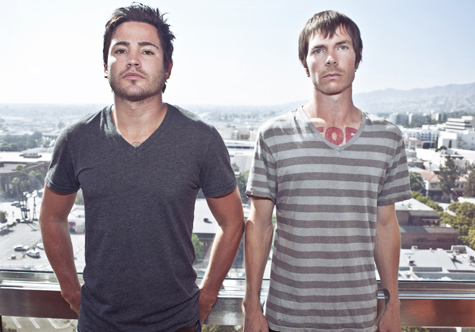Oscar’s Very Mexican Food
1350 Harbor Boulevard • West Sacramento
Amigas, we are lucky to be living here in this land called California. Nowhere else on Earth is it possible to find so much mouthwatering Mexican food. Nowhere. The Midwest doesn’t have it, Texas doesn’t have the same quality, the East Coast doesn’t really try, apparently. And yet, we’ve got a taqueria for every nook and a Mexican eatery for every cranny that our state can provide. Here in Sacramento, things are no different. The offerings are rich and variegated, fast or slow, independent establishments or franchise chains; we’ve got them all.
But only one, and now two, can be classified under the tagline “Very Mexican Food.” That’s right, I speak of the longstanding Oscar’s Very Mexican Food, in all its glory. This small hole-in-the-wall, perched quietly across from McKinley High School, is a sort of rite of passage for generations of Land Park youth. Since it opened its doors in 2001, this restaurant has been doling out some of the most consistent and tasty Mexican food in town, at phenomenally reasonable prices.
Though the Freeport Boulevard location has been closed for most of the past year, Oscar’s did move its staff to West Sacramento to open its second location during the hiatus, where it forges on today. Those of us who live in the city limits are unlikely to make the trip over the river unless we need some wood-particle furniture or something, but we need not worry about this separation any longer: Oscar’s OG location is officially back up and running with a significant remodel to both the kitchen and the dining area. Our personal favorite addition: the lavatory sink is outside of the lavatory, in the dining area, allowing patrons to observe who washes and does not wash sus manos after visiting los baños, and judge accordingly. But we digress.

There are staples that a very Mexican establishment must have. Oscar’s is the California burrito. It’s a burrito with carne asada, guacamole and French fries inside. It suits nicely on a summer afternoon when one might want some weight in their belly. However, our personal favorite is a split between two other burritos. First is the egg, bean and cheese breakfast burrito, which is a simple, filling item that pairs well with coffee or cerveza. Sadly, Oscar’s doesn’t sell booze, which means any adult pairings are best done within the privacy of one’s own casa. The second burrito that we regularly crave is a simple one: chicken. This particular item is a sort of post-university staple that sustained us as we worked odd labor jobs after graduating. It’s cheap, roughly $3.00, and simple (shredded chicken in some red sauce), and yet it continues to satisfy as necessary.
On this occasion, we ventured over the river to try the wares of the West Sacramento joint. Stationed on Harbor Boulevard, the West Sac offering of very Mexican food is a bit more reminiscent of the original in size. There’s a small sampling of tables and the kitchen is visible from most of the dining area. West Sac does, however, come equipped with television, so we were able to watch the kick-off of Monday Night Football. Which is a thing.

The quality of the food was up to the Oscar’s standard. We decided to get out of our comfort zone a bit and tackle a chicken chimichanga, a tortilla that was fried to a crisp exterior, which came stuffed with shredded chicken. Generous portions of lettuce, cheddar cheese, sour cream and guacamole adorned the sides. This item left us wanting little. And yet we continued.
Any Mexican restaurant worth its salt should have a succulent carne asada dish, so we got the combination plate, which came with beans and rice, pico de gallo and guacamole. The meat was seasoned well, cut into tiny bite-size pieces, and when mixed with the sides had the right balance of sweet and savory. This is the sort of entrée that’s great after going to the gym, riding a bicycle or gentrifying a formerly industrial neighborhood.
To go along with this, we also branched out into the carnitas, another standard that can make or break a Mexican spot. The carnitas tacos did not disappoint. The pork was flavorful and juicy, not dried out or overly chewy. Each bite had the right texture and seasoning, and compelled us to finish the tacos. These too, like the majority of Oscar’s Very Mexican Food, are moderately priced. The great thing about Oscar’s is that most of what you order, after having consumed it, seems like it should cost more. At those other Mexican spots—which for the record, we like a lot—it’s like the extra dollar here and there pay for fancy soccer jerseys or something; whereas at Oscar’s, there are no frills, bells, whistles or fancy menus. It’s a proper working-class Mexican spot, and this is why we love it.
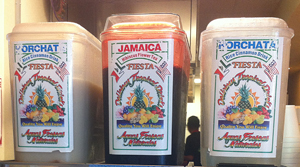 The beverage offerings are par for the course. There are fountain sodas that come in solid white Styrofoam, just the way mass production intended, containing neither branding nor care for the environment. There are bottled drinks, composed of a few Jarritos, which when the time is right, are nice to have. And if you like your Coke made with actual sugar cane instead of corn syrup, the Mexican Coke bottles are also available. But our drink of choice, when dining on “Very Mexican Food,” is horchata, a Mexican rice milk seasoned with cinnamon. We’re fairly convinced that the large quantities offered at places like Oscar’s must have some sort of mass-produced recipe, but nonetheless, it’s the beverage to have in a large helping when consuming these delicious eats, especially when cold beer is unavailable.
The beverage offerings are par for the course. There are fountain sodas that come in solid white Styrofoam, just the way mass production intended, containing neither branding nor care for the environment. There are bottled drinks, composed of a few Jarritos, which when the time is right, are nice to have. And if you like your Coke made with actual sugar cane instead of corn syrup, the Mexican Coke bottles are also available. But our drink of choice, when dining on “Very Mexican Food,” is horchata, a Mexican rice milk seasoned with cinnamon. We’re fairly convinced that the large quantities offered at places like Oscar’s must have some sort of mass-produced recipe, but nonetheless, it’s the beverage to have in a large helping when consuming these delicious eats, especially when cold beer is unavailable.
In sum, Oscar’s Very Mexican Food is the perfect sort of restaurant. It won’t break the bank, it’s easy to get to, it offers a steady and consistent menu that rarely disappoints. There’s now twice as much Oscar’s to go around for both Sacramentos, East and West. Viva Oscar’s!
Singer/Songwriter Sherman Baker bears his soul, battles addiction and existential dread…all in a day’s work
Words by Joseph Atkins – Photos by Amy Scott
Sherman Baker has lived multiple lives: struggling Los Angeles actor, recovering heroin addict, mild-mannered songwriter. Yet, there’s something about him that eschews both of the former descriptions and settles on the latter. Baker’s bigger than you imagine, listening to his new full-length, Seventeenth Street. His songs make him sound fragile, delicate; but in person his wide shoulders wrap a guitar while he sings upwards into a microphone. On stage he appears focused, intent. His look is exactly right for the sound, and the qualities of Baker’s sound ultimately condition the person he is.
Up close, it’s hard to tell how much of his personality is shaped by the quiet childhood he describes or the humility of a recovering addict, or where they bleed together. But their silent strength produces songs that slowly engulf one’s attention. Baker has enough self-confidence to expose himself, musically or otherwise, to talk honestly about his past and present. He has a soft-spoken manner that leaves a small impression. He’s like a subtle fill that piques one’s interest and becomes the highlight of a track after multiple listens. He’s normal yet unique, exotic in his low-key banality.
There’s a subtlety to his brand of song craft, a fusion of Dylan and Elliott Smith, with the tonal foundations of old school pop. His hooks and harmonies draw out the anguish and joy of repeated failure and angst, verse after verse. Below them, a series of string melodies and rhythms complement and exacerbate his vocal tracks, as the lyric content demands. There’s a focused tension on the struggle of daily life and survival, but I’d suggest this is bigger than just Baker’s struggle with himself. Seventeenth Street is relaxing, serious and thoughtful in its treatment of uncertain conditions–Baker’s and otherwise. We sat down over water and espresso to discuss these uncertainties, the ups and downs of growing.
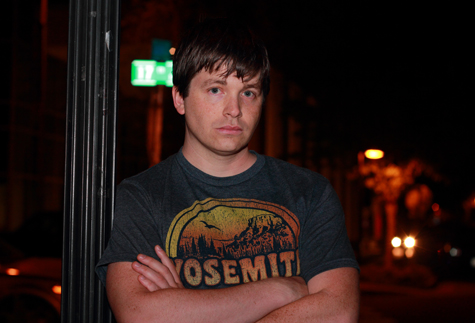
On your opening track, “Constant Contact,” you plead repeatedly for the world to “stop posting things.” Did you check in on Foursquare when we got here?
I did not. I’ve been trying really hard to not be obvious like that. That song came from Facebook [where] an ex-girlfriend used to post about me while we were dating. She’d be like, “Don’t you hate when guys do this.” And then 20 lurker dudes would be like, “Yeah, fuck that guy.”
Do you have other songs about her?
Some of the other songs like, “Golden Gate Park,” “Man on a Wire” and “Sign of Light” are about a [different] ex-girlfriend whom I feel essentially left me for dead and didn’t seem to care that I was overdosing and attempting suicide.
In one of my favorite lines from “Sign of Life” you sing, “There’s no time for philosophy/When you’re fighting/To survive.” The next track follows with another line: “We have tried to be good/But I’d rather be wrong than dead inside.” What is the major antagonist in your life?
The new record is basically about heroin addiction. I was shooting heroin in 2008 to 2009. It wasn’t like, “Oh, Elliott Smith did it, or John Coltrane.” It was a simple addict progression from Vicodin to heroin. A typical Intervention episode was my life. I went to rehab, and after six or seven weeks of horror, I finally came out. The last two years I’ve been moving away from it. I tried to off myself. I was put in a mental hospital. The tension is me trying to fight existential dread.
Yours is actually a success story. Many addicts never even get to rehab. How were you able make the decision to get clean and stay that way?
It’s a daily struggle to stay clean, but I need to in order to survive. There isn’t a way to abuse opiates that doesn’t end in death or severe impairment. My uncle was kind enough to pay for me to go after I asked him for help. It was in L.A. I needed to get out of town. I went a long way from any dealers or money. I was forced to spend a month in one bed crying, shitting and puking on myself. Literally. It was so incredibly painful emotionally; I have felt a little bit numbed ever since. But I’m also certainly a much stronger person. I’m lucky.
I think really great artists tend to be addicted to creating. Do you feel like overcoming one addiction has allowed you to focus your attention more into your musicianship?
One hundred percent. On a physical level, my energy is up; it’s like night and day. I’ve been looking at my music like an athlete–how can I get better every day? Quitting smoking, writing every day, practicing every day, I’m always thinking about what things are helping me. I have a drive to write and make music that is certainly not rational. I’m not making money. Music is my art.
You’re releasing the album yourself. How’d it all come together?
My father died, which opened up money from my family that wasn’t being used for his medical care. I had a really low budget. I recorded a lot of it at my uncle’s house. He’s got a really big place up in Granite Bay. We actually did some of the drums. All the guitars, all the vocals, all the bass–everything I did–was done there.
We mixed at The Hangar and did some of the live drums and bass there. Matt McCord played drums, and Kris Anaya [Doom Bird] played bass on a few songs. Robert “Flossy” Cheek did the mixing.
There’s a definite Elliott Smith influence on the record, but the recording process sounds a lot like his process as well.
Elliott Smith would be a good analogy except I don’t play drums–minus the brilliance factor.
Losing your father seems like a big moment in your narrative. Are there points on the new CD where his loss is felt?Â
Yes, “Lonely Star” is about him to some degree. The bridge lyrics, “Where is the green light?/The future you told me of?” is a reference to The Great Gatsby’s last page about the green light of the dock. It was my father’s favorite book. A lot of the record is about mortality in some way. That might be part of the problem with selling it.Â
What happens if you never sell all the CDs you print?
I’m used to disappointment. If people don’t want to buy my music, I can’t force them to… I’m pretty reconciled to living a low income, humble lifestyle, regardless.
Do you still believe in those divisions between DIY, indie and major labels?
Not really. Death Grips are the latest example of a “big deal,” and they’re as DIY as it gets. I think pipe dreams have definitely disappeared. In the ‘90s, there were a lot of kids thinking, “I just gotta get that deal and then… Chicks!”
You spent some time in L.A. as an actor. How did you get there?
I got into a good acting school. It’s where Denzel Washington went; Elizabeth Banks was there while I was. It actually helped me learn to sing. By the time I left, I just wanted to do music. I went to L.A. because I had an agent; it was a great opportunity. I was trying to get on soap operas. I wanted to focus on music instead.
Then in 2007 my personal life got crazy, and I just dropped out and did drugs for two or three years. I didn’t do much at all. I did in my head, but I wasn’t functioning.
You’ve mentioned that there’s a lot about yourself–your voice, how you look on camera, people watching you–that makes you anxious or nervous. Are we socialized to be confident individuals and overcritical of everyone else?
In a word, yes. I’ve always been kind of shocked at how I’ve put my heart out there and then had it taken apart by a critic or local Internet commentator. I guess it’s my own naiveté. To tear apart local struggling artists and critique a person as if you are writing for the New York Times, reviewing a show at Carnegie Hall, is the height of arrogance. Blogger culture is gross. It’s too easy just to spout off about what you don’t like or do like.
Acting seems like a curious choice seeing as you feel uncomfortable in front of a camera.
I don’t like being looked at. I don’t like being on stage and being looked at, still. I don’t mind being heard because I’m comfortable with how I sound. My stage presence is just as shitty as it ever was; I just stare at the ground and sing. I just couldn’t care less about my stage presence. I’ve just never said, “Oh, I wish I could be like Steven Tyler.” Never. I just don’t care.
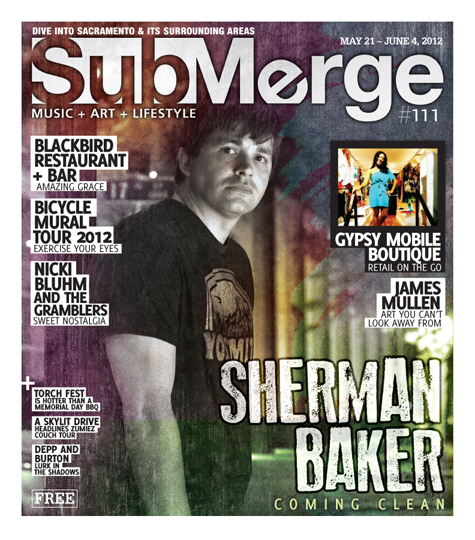
Head to Beatnik Studios in Sacramento on June 2, 2012 to celebrate the release of Sherman Baker’s newest album, Seventeenth Street. Also performing will be Autumn Sky, who also happens to be releasing her new CD that day. If that wasn’t enough for you, Ricky Berger will open. Showtime is 7 p.m. For more info, go to http://shermanbakermusic.com/.
Shocking Subjects, Sensationally: The Comedy of John Ross
Words by Joseph Atkins | Photos by Duy Ninh
John Ross is occasionally unshaven, his hair is regularly maintained, and he wears thin black glasses. He’s got a low-key demeanor emphasized by his polo shirts and Dickies pants. He’s got three kids, a stable marriage, and he just got a job selling plumbing supplies. He’s a regular, well, John. Oh, and as a hobby he writes and performs jokes.
Ross has a dry sense of humor that depends on awkwardness, absurdity, and tension. He’s not flamboyant, in your face or crazy on stage. Ross slowly threads out a joke, waits a few seconds to build the audience’s confusion, and then flatly drops the punchline. After awkward crickets, suddenly everyone is laughing.
To summarize his story is to sensationalize it: Ross was born addicted to methadone, his parents were junkies, and he was molested once by a 12-year-old. But in talking to Ross, you’d never know such an average dude would have such an Oprah-esque back-story. But with his comedy, the audience is invited to laugh at and laugh with Ross: while he uses his sensational history for subject matter, he’s likely smiling the entire time and repeatedly shattering the boundaries of personal-information discomfort.
In July, Ross recorded his live set at the Sacramento Comedy Spot and since then has been hard at work editing it into a DVD feature. Ross will celebrate the DVD release of I Really, Really Love Me Nov. 13, 2010 by sharing the stage with his favorite local comedians and friends. We sat down just next to the Comedy Spot and discussed comedy, family and sensationalism over slices of pizza. For most of the interview, a group of children ran around us, sword fighting.
So, what does being born addicted to methadone mean?
It means my mom was born addicted to heroin, and my mom went on methadone to make sure I wasn’t retarded or developmentally disabled. There’s a weaning process, detox, when I was an infant. As far as I know there were no long-term effects. I don’t walk with a limp or anything. I do have a hard time focusing; I wonder sometimes if it has something to do with that. Or I’m just normal.
Your comedy relies a lot on your personal history. Why is that?
This sounds really cheesy, but I think I have a very interesting upbringing. Everything from being raised by junkies, to being Pentecostal Christian for a while–I’ve been through a lot of weird things. This might sound really retarded, but it might be an interesting story, so why not tell it? Not to exploit it. I’m not saying I think it’s a story that needs to be told to the world, but it’s a good story. A lot of my stuff is character-based, kind of true, kind of real, just embellished a little bit. I just tell you a story…
How did you decide that stuff would be a good subject for jokes?
It was kind of my first instinct when I started. I could do tons of dick jokes, jokes about having sex. If I do my parents are heroin addicts jokes, I know I’m not accidentally copying anyone. I’ve been doing jokes about when I was molested when I was 4, by a 12-year-old. Yeah they’re pretty harsh subjects, but it’s fucking funny. I like to build tension, and then release it. And if you’re going to steal my joke, it’s going to be obvious. Everyone’s going to know it.
What is it about absurdity that is so funny?
It’s just that you can say something and not say anything at all. You can take a real issue, something that you’re passionate about, but unless you’re like George Carlin or something, no one wants to hear you. Absurdity can take something pretty far; you can say something you wouldn’t say in a regular conversation. I’ve got a joke that Elvis is a racist, and I’m like, “I’m already a fan!” The further you go, the more obvious you’re not a racist. You can take a sensitive issue and go as far as you want; the further you go the more people know you’re not serious. They start uncomfortable and by the time you’re finished, they’re like, Thank God, he’s joking.
I think comedy is about awkwardness. I like to make feel people feel awkward, corporately. And let them know I’m messing around. I like to be as honest and absurd as I can. I don’t choke up. Anything horrible I try to make a joke out of; maybe it’s a defense mechanism.
I think your act is pretty funny, but I could imagine that some people might not really get what you’re doing. How do crowds react differently to your joke aesthetic?
With smart crowds you can get away with a lot more, people who know comedy. More conservative crowds, they just want to hear dick jokes, they don’t get subtlety. Lately I just say what I’m going to say. I did a show in Woodland, and it was a great crowd. But I could tell that I was making them uncomfortable. I didn’t apologize, or I didn’t apologize too much. If I get a really conservative crowd that isn’t biting on anything, I will punish them. Sometimes it’s just fun to be on stage, tell the awkward story to your friends.
Part of your routine relies on a weird music-box device. What’s that called?
It’s called an Omnichord. With the Omnichord I have to be careful, anything more than 15 minutes, people start going, “What the fuck? This is annoying.” In a shorter set, with the Omnichord, I like to do a lot of non-sequiturs, one-liners. You can get away with a lot of darker stuff with the Omnichord.

There’s a lot of shocking subject matter in your jokes. Would you consider your jokes in the tradition of shock?
I’m not going to say fuck just to say fuck. I’m not going to talk about junkies just because. I don’t go out to shock for the sake of shock. I’m not as edgy as some comics are. I’m actually fairly clean compared to some comics.
When you’re writing material, do you have an agenda, or are you just trying to come up with funny things?
I’m only 32, but the older I get, the more agenda-ridden I get. If I want to talk about something, I just do. My daughter turned 1 the other day, and I was thinking about it, all the change she’s going to see in her lifetime, all the technology. And the one thing I hope she sees before she dies is her first white president. As long as she makes it to like 3, she’s pretty good. Like wow, she only knows a black president. How weird is that?
Race seems to be somewhat taboo in our culture. What’s up with that?
I do a lot of racial jokes. I try not to do racist jokes. Race is fascinating to me, and I don’t think you find a lot of white guys doing race jokes. I don’t make fun of the homeless, but I saw a homeless guy wearing a “World’s Greatest Dad” shirt. And I was like, that’s all I have to say. I saw him. That’s the end of that joke.
You’ve been performing comedy for six years; who have you performed with?
I got to open for Bobcat Goldthwait at Laughs Unlimited last year. I think he’s doing comedy just to pay for his divorce. He was really nice; he bought me dinner. I thought he was funny.
The biggest guy I ever opened for was Norm MacDonald. I was in Los Angeles, and my buddy runs the Hollywood Improv and he put me last on an early show. It was completely packed. Right before I went up the promoter told me to cut my set to five to six minutes, Norm MacDonald had just shown up. And I’m like what the fuck! Norm MacDonald is my favorite. I love this guy. I had one of the best sets ever. I got done and I was shaking hands, and I look up and it’s Norm MacDonald. He was like, “You’re really funny there. That was really funny.” I was like, “Thank you, Norm MacDonald.” Oh my God. I floated back to my seat. I watched him bomb, it was funny. He was drunk. He’s a throwaway comic anyway. He doesn’t care.
That same night I met Nick Swardson. I talked with Gallagher at the bar too. My buddy told me he’s gay. I heard he tries to fuck young comics. He’s self-hating, that’s why he crushes fruit. He was kind of bitter. My buddy was like, “Watch out, man.” I’m thinking, “Gallagher’s not gonna fuck me. Well maybe he could, if it would help my career.” We talked about my Omnichord. He gave me some good ideas on how to use it. It was pretty surreal.
That was the best night of comedy ever. One night in L.A. is like six months in Sacramento as far as networking. I just met a ton of people on an off night, a Sunday night.
What advice would you give to aspiring comedians?
If there’s something fucked up in your life, find it and make it funny. And don’t steal shit.
Thanks man.
Thank you. If you can, don’t make me look like a dick.

John Ross will celebrate the release of his DVD, I Really, Really Love Me, at the Sacramento Comedy Spot on Nov. 13. Tickets are $10, and the show time is 7 p.m. DVDs will be on sale at the event for $7. For more information, go to www.saccomedyspot.com.
Middle Class Rut Ready Their Full-Length Debut
Guy Debord, the pivotal member of the French art collective known as the Situationist International, once graffitied Paris with the slogan “Never Work.” In his book Lipstick Traces, Griel Marcus ties the SI as the real precursors of the punk-anarchist tradition. In a related way, Middle Class Rut embodies an angst that directly confronts the conditions of our world. Zack Lopez (guitar/vocals) and Sean Stockham (drums/vocals) use their songs to take swings at the monotony of the working class experience. It’s imbedded in the lyrics of songs like “Lifelong Dayshift” where both members double down on the chorus to create a throat-thick hook reminiscent of Filter: “Your life/It ain’t worth wasting mine on. I won’t accept that every day/Will just be thrown away.” A sentiment that anyone who’s ever had a miserable job can identify with. Lopez and Stockham don’t stop with lyric sentiment; they crank up their sounds to ear bleeding and make sure that their message gets loudly through to the audience. That message isn’t directly anarchist but is closely related via the spirit of DIY. Angry at the prerequisite struggle built into DIY, MC Rut’s debut full-length album, No Name No Color, becomes an example of a hard-wrought self-made body of work. Operating independently (self-recorded, self-produced), MC Rut is succeeding at making things for themselves and that ever-elusive ability to be happy doing it.
MC Rut met with Submerge at a Starbucks on Madison. Without an interior for customers to sit in, it was a fitting example of our service economy. We drank coffee over the squeals and rumbles that signify our ever-fluid social relations, and here we discussed their jejune flirtations with a major label, family and their recent tours with Alice in Chains, …And You Will Know Us By the Trail of Dead, Them Crooked Vultures, The Bronx and Social Distortion.
“It’s cool to go out and support a band like Alice in Chains, just for the opportunity to do it,” said Stockham.
“And that was huge for us,” added Lopez. Thankful for the opportunities, MC Rut is ready to branch out on its own. Anxious to reap the benefits of their own labor, Lopez gets adamant about headlining. “We’d rather headline basements,” he said, “and have everyone there for us than go out on another support tour. We’ve been an opening band our whole life.”
“When you’re 16 or 17 you get so excited to just get out of your hometown,” said Stockham. “The first couple of tours we did when we were younger, it wasn’t about how many people showed up or how much merchandise we sold, it was about the fact that we’re in a van driving across the world. Then we got a little bit older and had kids, and we didn’t want to do that shitty van tour anymore.”
“And we still did,” nodded Lopez. “We were thinking we just got to pay our dues. It’ll happen.”
Their previous group, Leisure, disbanded in 2004 after years of hype and little to show for their efforts. “It wasn’t until we got honest again that we started going anywhere,” said Lopez. “Getting in a record deal and being in a certain situation, you think that you can fool people. It just doesn’t pan out that way. Money was a joke then. If you knew the right person, they were just handing it out.”
Stockham added flatly, “The industry has been flipped over.” While things have changed dramatically for both major labels and bands, MC Rut is still able to take advantage of their connections to the majors. “[Our label] Bright Antenna still gets to operate the way they want to. They hire their own radio person, we hire our own artwork, together we pay for everything, but ILG and Warner make sure [our stuff] gets out everywhere,” said Stockham.
And, in case our readers haven’t been paying attention, MC Rut has been everywhere. They were getting radio play on KWOD 106.5 before the station changed formats, and their CD release Oct. 8, 210 at the Boardwalk is getting attention as one of Radio 94.7’s $9.47 shows.
Yet despite this recent success, MC Rut is doing something a little different than many of today’s popular bands. Embedded into their songs, into their angst, is the late ‘90s feel of Jane’s Addiction, Rage Against the Machine, Filter and a punk rock attitude.
“You’re kind of discouraged nowadays from even being a heavy band,” said Lopez. “Especially with the indie scene how it got so big. I couldn’t be less cool showing up to the club with the rig that I have. That’s just who we are at heart. We’ve always just loved really honest, energetic, really heavy loud music.”
“We can easily feel outdated,” seconded Stockham. “Depending on what part of the world or what show we get thrown onto at the end of the night. Heavy music is still really big. Active rock, Disturbed, Godsmack–that shit is huge in the middle part of America. But when you go to London and you’re playing the hip cool place, we’re not playing to Disturbed fans. We’re playing to people who like Vampire Weekend, and that’s the scene we’re talking about. We feel like we can’t relate to them, and they can’t relate to us.”
“We wish that this band could be in the old Sacramento scene,” said Lopez. “You couldn’t beat that scene back then. Now there’s no central place, the downtown scene is totally different.”
While the places have changed, the lifestyle hasn’t; and MC Rut is a testament to the difficulty of overcoming the systemic necessity of day labor. Both members have kids and homes to support; yet they constantly sacrifice family time for music. “If you love what you’re doing that should be what you’re doing,” said Lopez. “It was a lot harder for me personally, working and existing as a normal guy, being someone I wasn’t. I was building houses in Los Angeles. That was way harder for me than it was to leave my family and go out on the road to do something that I loved. If I’m home and I’m miserable because of my job, I’m just treating everyone like shit anyways. You can burn months, years even, in a certain routine. Just stacking time against yourself.”
“I didn’t even get my high school diploma,” revealed Stockham. “Like, ‘I’m going to be a rock star at age 19.’ When that didn’t work out and you’re forced to get a job, it’s factory work. In a funny way we want to have the stability of a 9-to-5, just playing music. Health insurance would be dope.”
Like too many Americans, MC Rut has to juggle their work with their livelihoods, sometimes at the consequences of self-preservation. When it’s not weighing down their bills, this tension manifests itself in the track “One Debt Away.” The chorus is a simple affirmation: “Be glad/To be home.” The first half is belted out with all the angst discussed above, the second half declines into a less tenuous space, the melodic thought of domesticity.
“We haven’t been to the doctor or the dentist in like 12 years,” laughed Lopez.
“There are times where it’s just an emergency, and it becomes this really expensive thing,” said Stockham. “My credit is fucked, because I went to the doctor one time and didn’t have the money to pay the bill. Hopefully things will change.”
For MC Rut things have changed; they’ve finally put together an album full of momentum. It’s time to reveal it to the people. “It’s nice to have officially put out a record,” said Stockham. “Now we can just move on, go out and play as many shows as possible.”
Exquisite Corps, Der Spazm
Thursday, June 3, 2010 – Old Ironsides – Sacramento
Words by Joseph Atkins – Photos by Amy Scott
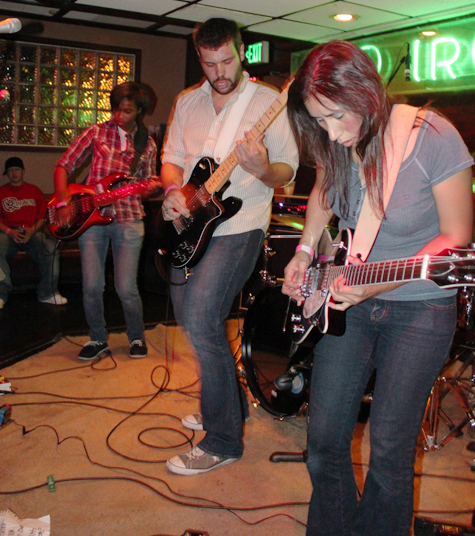
Der Spazm
In Der Spazm, Ashley provides bass and vocals, and Leticia provides the majority of the lead fretwork and floating octave accompaniment. Their songs are a patchwork of arpeggiated licks that float across the rhythm guitar and lyric lines of a young and lightly bearded frontman, Dillon. Bouncy and jittery, their tunes enable easy allusion to multiple post-punk groups. But rather than leave Der Spazm floundering at the feet of their mentors, we want to place them in our own time. The lyrics of one chorus in particular say, “Love is born in the heart of a/Revolution,” calling attention to our constant, varied antagonisms. The shout-climax of the word “revolution” is emphasized by both Dillon and Ashley (who wrote the lyrics).
The song was composed in response to the events preceding Prop 8, which officially legalized inequality, and we should note what has occurred since 2008. On a cultural basis we’re witnessing the erosion of personal liberties. A partial list goes something like this: Prop 8, California student protests and arrests, Arizona Immigration Act, BP oil spill censorship, culminating with the Israeli raid of a flotilla protest last week when a teenage U.S. citizen was shot through the head. Individually these events corrupt the universal ideas of say, “Life, liberty, and the pursuit of happiness,” and Der Spazm places love as an opposing force. Love is the thing growing, inside of the heart outwards, into the greater body at large, circulating through the body politic (“man,” that political animal), which realizes itself as revolution. Revolution isn’t necessarily the purpose; it’s a unified response to a militarized state opposition. While we’re not here to put politics into the jittery joyous melodies of Der Spazm, we are here to place Der Spazm’s spastic tensions within the politics of the world at large–the place where we all indefinitely exist. A place and time where Der Spazm is both pleasure and opposition in a direct, interconnected act.
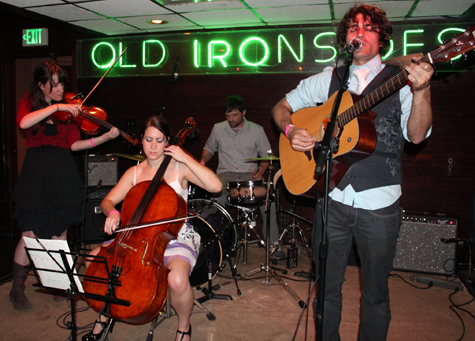
Exquisite Corps
To contrast the sounds of Der Spazm, Exquisite Corps placated the audience with the lulling movement of bows over a violin and cello combination. Krystyna Ogella primarily lays out the bass lines on cello, while Holly Harrison supplements vocal harmonies and provides lead melodies throughout the songs. Patrick Boylan keeps time on drums, rumbling the songs forward with a series of bass drum-floor tom rhythms, while Bryan Valenzuela provides the vocals and acoustic chord structures filling out the canvas of sound. The vocal melodies come out from the deep cavern of Valenzuela’s mouth, an arid timbre ricocheting out of his subtly parted lips, before rising into the higher registers. The songs are dominated by a sort of narrative lyric flow, a series of events set in chronological order accumulating tension until the choral release. Valenzuela’s shaggy curly hair throws shadows over his closed eyes as he grimaces and sneers his soft discomfort into the mic. The group achieves something slightly lighter than Murder By Death, though they share that sort of folk macabre on occasion. As a name for a young band playing its third show and already headlining, they make an interesting statement.
The surrealists developed the exquisite corpse exercise where each member draws something then covers it up so another can add to it without any conscious connection. Musically the group doesn’t recreate that spontaneity, instead the pun on the corpse as body into the sort of militarized corps, or group, as Valenzuela says, “Like the Marine Corps.” Forcing us backward through the garbage pile of history, the inter-war period of Europe, and landing in our time harmoniously disjunctive at that great venue Old Ironsides, established just after the surrealists themselves, 1934.
 The beverage offerings are par for the course. There are fountain sodas that come in solid white Styrofoam, just the way mass production intended, containing neither branding nor care for the environment. There are bottled drinks, composed of a few Jarritos, which when the time is right, are nice to have. And if you like your Coke made with actual sugar cane instead of corn syrup, the Mexican Coke bottles are also available. But our drink of choice, when dining on “Very Mexican Food,” is horchata, a Mexican rice milk seasoned with cinnamon. We’re fairly convinced that the large quantities offered at places like Oscar’s must have some sort of mass-produced recipe, but nonetheless, it’s the beverage to have in a large helping when consuming these delicious eats, especially when cold beer is unavailable.
The beverage offerings are par for the course. There are fountain sodas that come in solid white Styrofoam, just the way mass production intended, containing neither branding nor care for the environment. There are bottled drinks, composed of a few Jarritos, which when the time is right, are nice to have. And if you like your Coke made with actual sugar cane instead of corn syrup, the Mexican Coke bottles are also available. But our drink of choice, when dining on “Very Mexican Food,” is horchata, a Mexican rice milk seasoned with cinnamon. We’re fairly convinced that the large quantities offered at places like Oscar’s must have some sort of mass-produced recipe, but nonetheless, it’s the beverage to have in a large helping when consuming these delicious eats, especially when cold beer is unavailable. 







